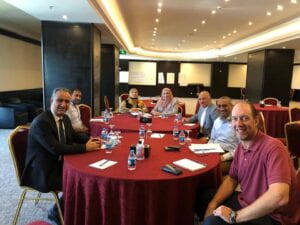 Professor Thomas Hill led a five-day workshop with a select group of faculty and leaders from the University of Fallujah (UoF) in Erbil, Iraq, August 23-27 as part of the Peace Research and Education Program’s (PREP) ongoing project “Strengthening Academic Institutions and Cultures at the University of Fallujah.” Professor Hill worked with the UoF faculty to explore the outcomes of a campus-wide UoF survey on teaching and learning. They also worked together to deepen understandings of and opportunities for blended learning. In addition, CGA Professor John Kane made a remote presentation to the UoF faculty via Zoom. Following the workshop, the UoF faculty asked PREP to participate in a new project focused on developing a center for peacebuilding at UoF.
Professor Thomas Hill led a five-day workshop with a select group of faculty and leaders from the University of Fallujah (UoF) in Erbil, Iraq, August 23-27 as part of the Peace Research and Education Program’s (PREP) ongoing project “Strengthening Academic Institutions and Cultures at the University of Fallujah.” Professor Hill worked with the UoF faculty to explore the outcomes of a campus-wide UoF survey on teaching and learning. They also worked together to deepen understandings of and opportunities for blended learning. In addition, CGA Professor John Kane made a remote presentation to the UoF faculty via Zoom. Following the workshop, the UoF faculty asked PREP to participate in a new project focused on developing a center for peacebuilding at UoF.
Belinda Cooper contributed a chapter entitled “The International Criminal Tribunal for the former Yugoslavia and the Development of Legal Frameworks on Violence against Women in Conflict” to The Routledge Handbook of Gender in Central-Eastern Europe and Eurasia (ed. Katalin Fabian, Janet Elise Johnson, and Mara Lazda), which was published in August.
Professor Christian Busch’s work on The Serendipity Mindset (www.theserendipitymindset.com) was shortlisted for the Thinkers 50 Distinguished Achievement Award (The “Oscars of Management Thinking” according to the Financial Times) in Innovation.
Professor Jennifer Trahan was asked by the UN to record a lecture on “War Crimes and War Crimes Prosecutions,” which she filmed during August 2021 at the UN’s recording studio. It will become part of the United Nations Audio Visual Library of International Law.
In August, following the withdrawal of U.S. troops, Dr. Waheguru Pal Singh Sidhu was invited on Doordarshan India’s primetime In Focus & Newsnight programs on several occasions to offer his insights on the unfolding Afghanistan crisis, and its regional and global implications. On 16 August 2021, Dr. Sidhu spoke on the impact of the unfolding turmoil in Afghanistan on the role of the UN, regional actors, especially China, Iran & Russia, and future of Afghans. Watch here.
On 23 August 2021, Dr. Sidhu opined that the U.S. and ISAF allies are accountable for the unfolding Afghanistan crisis, and their actions are having domestic and global repercussions. Watch here
On 25 August 2021, Dr. Sidhu discussed the implications of the emergency G7 summit for Afghanistan. He made three observations: First, by refusing to extend the evacuation deadline beyond 31 August, Joe Biden has handed a political victory to the Taliban, and highlighted fissures between G7 and NATO partners. Second, the G7 Meeting highlights the inability of US allies to operate independently of the US and raises uncomfortably parallels with the Afghan Nation Defense & Security Forces, which also collapsed as soon as US support was withdrawn. Finally, Biden’s rejection of the ‘nation-building’ role directly contradicts his December ‘Summit for Democracy’ conference. The shambolic exit from Afghanistan shows that while the US is willing to talk the ‘democracy’ talk, it is unwilling to walk the walk in supporting democracies, especially nascent ones. Watch here.
On 12 September Dr. Sidhu elaborated on the central dilemma for the UN in Afghnaistan: how to provide humanitarian assistance to 18 million people facing severe food crisis without seen to be recognizing the Taliban government, many of whose members are on its terrorist list. Watch here.
Additionally, Dr. Sidhu was quoted in India Today on the Afghan tragedy. He noted that UN Security Council Resolution 2593 was ‘feckless’ and serves the interest of countries that voted for it more than the people of Afghanistan or efforts to counter next-gen radical extremism. Read & listen here.
